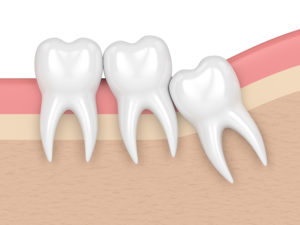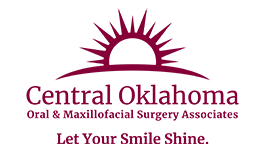04 Dec 5 Most Common Problems Created By Impacted Wisdom Teeth
 When your wisdom teeth fail to erupt properly and become impacted, you can develop a number of concerning symptoms. Some of the issues can seriously affect your oral health, so it’s important to address this condition if it affects you.
When your wisdom teeth fail to erupt properly and become impacted, you can develop a number of concerning symptoms. Some of the issues can seriously affect your oral health, so it’s important to address this condition if it affects you.
To prevent the problems associated with impacted wisdom teeth, patients should consult with an oral surgeon to explore the possibility of having those teeth extracted. In fact, many patients will opt for extracting impacted wisdom teeth that are asymptomatic to prevent such problems from developing.
Why do wisdom teeth become impacted?
At one time, humans had larger jaws, and they ate a much rougher diet that was harder on the teeth, often leading them to be damaged or lost. In these early humans, the large wisdom teeth were able to erupt properly and they were valuable replacements for teeth lost to wear and tear.
However, over time, human jaws have gotten smaller and our diets softer. Most people’s jaws don’t have enough room to allow the wisdom teeth to erupt completely, and they become impacted, lodged in either the bone or gum tissue. In such cases, an oral surgeon must extract them surgically.
What problems are caused by impacted wisdom teeth?
Impacted wisdom teeth are problematic in a number of ways. They can cause the following issues for patients.
- Jaw pain
- Bad breath
- Swelling
- Bleeding gums
- Difficulty opening your mouth
Not only are some of these symptoms nuisances, but they might also indicate serious oral health issues. For example, bad breath can signal the presence of excessive oral bacteria, otherwise known as infection. Left unchecked, such infection can lead to tooth and bone loss.
What should I do about impacted wisdom teeth?
The first step in addressing impacted wisdom teeth is to schedule a consultation with an oral surgeon. Evidence of impacted wisdom teeth can be present in patients as young as their mid-teens, and it is recommended that patients have their wisdom teeth extracted no later than age 25.
If you are in your late teens or early 20s and your wisdom teeth haven’t come in yet (or you’re the parent of such a person), call Central Oklahoma Oral & Maxillofacial Surgery Associates to schedule an evaluation and learn about your treatment options.
